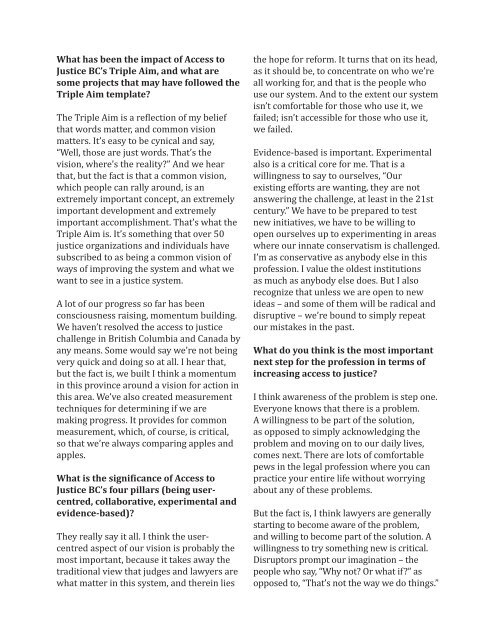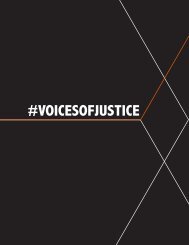Chief Justice Robert Bauman – The Justice Hack – Voices of Justice Magazine 2021
A conversation with the Honourable Robert Bauman, Chief Justice of British Columbia, for Voices of Justice, a project that discusses access to justice in British Columbia.
A conversation with the Honourable Robert Bauman, Chief Justice of British Columbia, for Voices of Justice, a project that discusses access to justice in British Columbia.
Create successful ePaper yourself
Turn your PDF publications into a flip-book with our unique Google optimized e-Paper software.
What has been the impact <strong>of</strong> Access to<br />
<strong>Justice</strong> BC’s Triple Aim, and what are<br />
some projects that may have followed the<br />
Triple Aim template?<br />
<strong>The</strong> Triple Aim is a reflection <strong>of</strong> my belief<br />
that words matter, and common vision<br />
matters. It’s easy to be cynical and say,<br />
“Well, those are just words. That’s the<br />
vision, where’s the reality?” And we hear<br />
that, but the fact is that a common vision,<br />
which people can rally around, is an<br />
extremely important concept, an extremely<br />
important development and extremely<br />
important accomplishment. That’s what the<br />
Triple Aim is. It’s something that over 50<br />
justice organizations and individuals have<br />
subscribed to as being a common vision <strong>of</strong><br />
ways <strong>of</strong> improving the system and what we<br />
want to see in a justice system.<br />
A lot <strong>of</strong> our progress so far has been<br />
consciousness raising, momentum building.<br />
We haven’t resolved the access to justice<br />
challenge in British Columbia and Canada by<br />
any means. Some would say we’re not being<br />
very quick and doing so at all. I hear that,<br />
but the fact is, we built I think a momentum<br />
in this province around a vision for action in<br />
this area. We’ve also created measurement<br />
techniques for determining if we are<br />
making progress. It provides for common<br />
measurement, which, <strong>of</strong> course, is critical,<br />
so that we’re always comparing apples and<br />
apples.<br />
What is the significance <strong>of</strong> Access to<br />
<strong>Justice</strong> BC’s four pillars (being usercentred,<br />
collaborative, experimental and<br />
evidence-based)?<br />
<strong>The</strong>y really say it all. I think the usercentred<br />
aspect <strong>of</strong> our vision is probably the<br />
most important, because it takes away the<br />
traditional view that judges and lawyers are<br />
what matter in this system, and therein lies<br />
the hope for reform. It turns that on its head,<br />
as it should be, to concentrate on who we’re<br />
all working for, and that is the people who<br />
use our system. And to the extent our system<br />
isn’t comfortable for those who use it, we<br />
failed; isn’t accessible for those who use it,<br />
we failed.<br />
Evidence-based is important. Experimental<br />
also is a critical core for me. That is a<br />
willingness to say to ourselves, “Our<br />
existing efforts are wanting, they are not<br />
answering the challenge, at least in the 21st<br />
century.” We have to be prepared to test<br />
new initiatives, we have to be willing to<br />
open ourselves up to experimenting in areas<br />
where our innate conservatism is challenged.<br />
I’m as conservative as anybody else in this<br />
pr<strong>of</strong>ession. I value the oldest institutions<br />
as much as anybody else does. But I also<br />
recognize that unless we are open to new<br />
ideas <strong>–</strong> and some <strong>of</strong> them will be radical and<br />
disruptive <strong>–</strong> we’re bound to simply repeat<br />
our mistakes in the past.<br />
What do you think is the most important<br />
next step for the pr<strong>of</strong>ession in terms <strong>of</strong><br />
increasing access to justice?<br />
I think awareness <strong>of</strong> the problem is step one.<br />
Everyone knows that there is a problem.<br />
A willingness to be part <strong>of</strong> the solution,<br />
as opposed to simply acknowledging the<br />
problem and moving on to our daily lives,<br />
comes next. <strong>The</strong>re are lots <strong>of</strong> comfortable<br />
pews in the legal pr<strong>of</strong>ession where you can<br />
practice your entire life without worrying<br />
about any <strong>of</strong> these problems.<br />
But the fact is, I think lawyers are generally<br />
starting to become aware <strong>of</strong> the problem,<br />
and willing to become part <strong>of</strong> the solution. A<br />
willingness to try something new is critical.<br />
Disruptors prompt our imagination <strong>–</strong> the<br />
people who say, “Why not? Or what if?” as<br />
opposed to, “That’s not the way we do things.”



